商务英语9-businessenglish_第九单元
- 格式:doc
- 大小:317.50 KB
- 文档页数:52
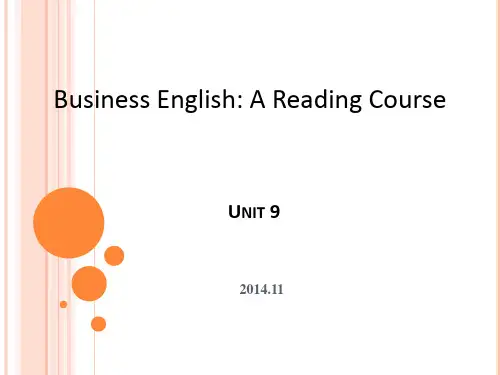
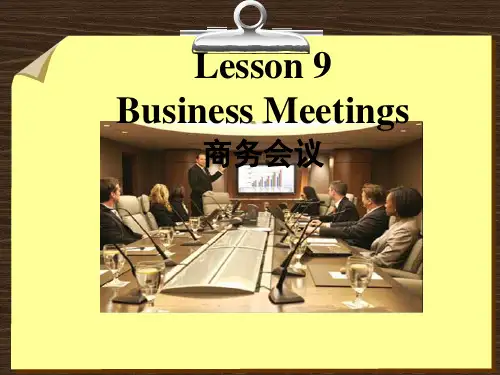
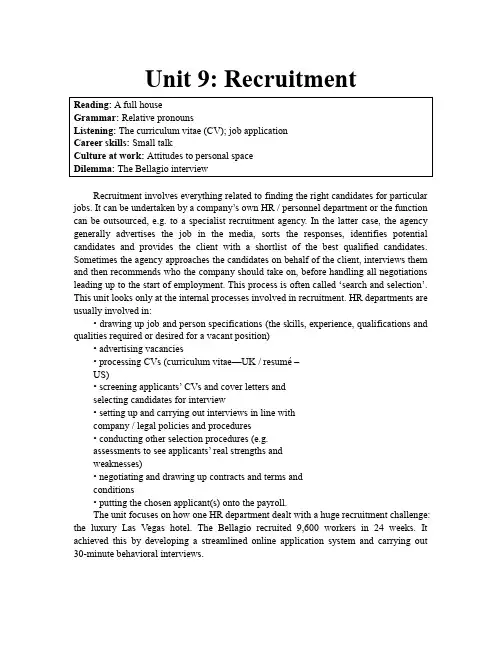
Unit 9: RecruitmentRecruitment involves everything related to finding the right candidates for particular jobs. It can be undertaken by a company’s own HR / personnel department or the function can be outsourced, e.g. to a specialist recruitment agency. In the latter case, the agency generally advertises the job in the media, sorts the responses, identifies potential candidates and provides the client with a shortlist of the best qualified candidates. Sometimes the agency approaches the candidates on behalf of the client, interviews them and then recommends who the company should take on, before handling all negotiations leading up to the start of employment. This process is often called ‘search and selection’. This unit looks only at the internal processes involved in recruitment. HR departments are usually involved in:• drawing up job and person specifications (the skills, experience, qualifications and qualities required or desired for a vacant position)• advertising vacancie s• processing CVs (curriculum vitae—UK / resumé –US)• screening applicants’ CVs and cover letters andselecting candidates for interview• setting up and carrying out interviews in line withcompany / legal policies and procedures• conducting other selection procedures (e.g.assessments to see applicants’ real strengths andweaknesses)• negotiating and drawing up contracts and terms andconditions• putting the chosen applicant(s) onto the payroll.The unit focuses on how one HR department dealt with a huge recruitment challenge: the luxury Las Vegas hotel. The Bellagio recruited 9,600 workers in 24 weeks. It achieved this by developing a streamlined online application system and carrying out 30-minute behavioral interviews.Warming up1personnel; candidates; curriculum vitae; resumé; payrollScripts:Job interviews can generally be divided into three main types. The first is what I would call the ‘traditional interview’. This is usually just a series of standard questions about qualifications, work experience, knowledge and expectations. So what you have here is basically a list of quite straightforward questions, you know, like ‘What duties did you have in your previous job?’ This is still the model for a lot of interviews today. In my view it’s not the best to select staff. In fact I would say that it’s very often quite inappropriate.Then there’s the ‘case interview’ which is particularly challenging. What happens here is that the interviewer presents a problem and then follows this with a series of questions to find out how the candidate would approach the problem. To give you an idea, it might go something like this: ‘Company X wants to increase the number of university graduates that it hires every year by 50 per cent without exceeding its current budget, which is $2m. What would you advise them to do?’ Now this puts the candidate in a pretty uncomfortable position because they’re really being asked to do several things—to demonstrate that they can analyze the problem logically, formulate appropriate questions and communicate effectively with the interviewer. So it’s a pretty stressful form of interview.The third type is what’s known as the ‘behavioral interview’. It’s designed to find out how candidates actually behave in certain situations. The questions are usually based on anecdotes from the candidate’s own past. They’re designed to find out about how the candidates handled tricky situations and relationships in the past. A typical question might be ‘Can you give me an example of a situation where you had to follow orders that you didn’t agree with?’ Now that puts the pressure on the candidate because they have to find a good example and they have to do the talking, so it opens up a lot of information and the interviewer gets to see more of the person who’s sitting opposite.3Open question. Answers may involve:Self-Motivated; Hard working; decisive and effective learner; team-working; Helping others; Honesty; Ethical; Disciplined and punctual…Understanding the text11D 2B 3E 4C 5A2124 weeks: the time available for recruiting new staff2740: the interviews that were carried out320%: the percentage of applicants that were weeded out when applicants completed their online application form430 minutes: the standard length of interview58%: the percentage of applicants that were rejected when their CVs were checked6$1.9m: the fund were saved through this standardized recruitment process31background check and drug test2It could eliminate the files that managers usually keep at their desks3The new approach of employment is a success.4open question. Answers with reasonable explanations are acceptable.5open question.Language work1Applicants:1 appointment2 identity3 computer4 application5 checkout6 interview7 testThe HR team:1deadline 2system 3 screen 4 train 5 conduct 6 backgrounds 7 files22 challenge / challenge / challenger3 interview / interview / interviewee4 design / design / designer5 assess / assessment / assessor6 communicate / communication / communicator7 appoint / appointment / appointee32B 3E 4B 5A 6D42 in3 for 4from 5 to 6 for52 cover letter3 background4 small talk5 database6 payroll61Going online would spare human resources from the process.2As long as you completed the application, your answer would be proceeded to a checkout desk for the review of a staff member.3In the process, files that used to occupy managers’ desks could be eli minated.4Therefore, an electronic personnel file was developed to help transmit the application database to the new-hire database.5However, you should think in a global and strategical way if you want to have a voice.71我告诉经理们,这一技术将给予他们一直想要的雇佣解聘权,以及他们鲜少得到的完整权力。
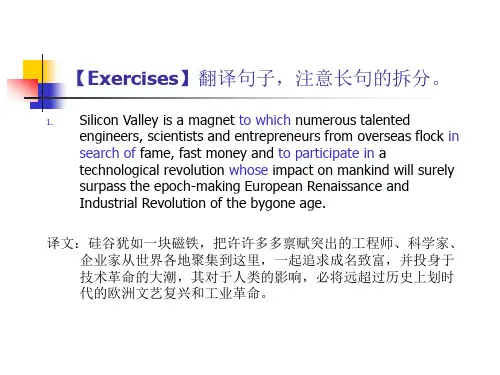
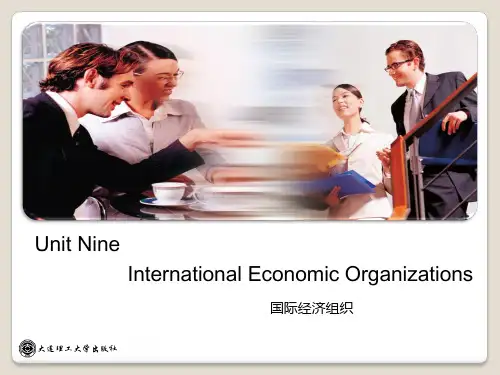
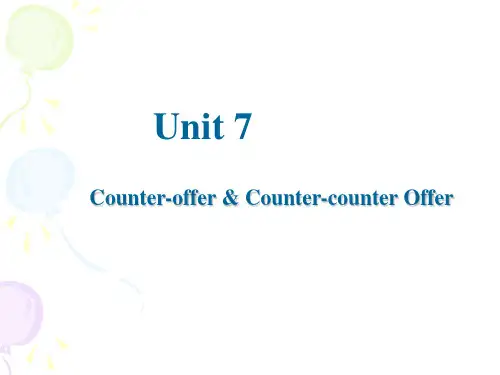



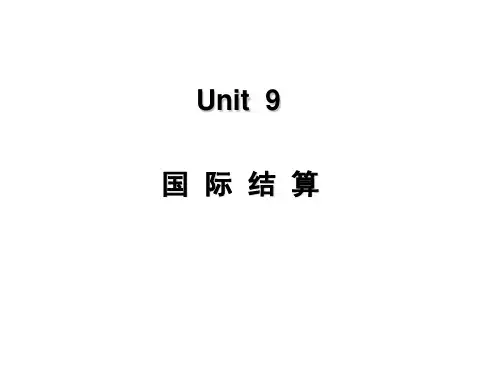

Unit 9 MoneyPart I Business VocabularyDirections: There are 10 incomplete sentences in this part. For each sentence there are four choices marked A, B, C and D. Choose the ONE that best completes the sentence. Then mark the corresponding letter on the Answer Sheet with a single line through the center. This part totals 20 points, two points for each sentence.1 Do you _____C_______ used items, such as clothing?.A give offB give upC give awayD give out2 Yule Catto, the chemicals group, launched a £240m _______C_________ for Holliday Chemical.A offerB quotationC bidD price3 Sales of the Financial Times hit an ______A________ record in November..A all-timeB pre-timeC over-timeD a-time4 The South Sea Bubble had C and it led to an economic depression in the country.A brokenB outbrokenC burstD burst out5 Foreigners joined in the _______D_______ to buy the flowers and money poured into Holland from other countries..A runB snatchC seizureD rush6 In 1673, the boom in the market ended. No one knows why, but people began to sell. Others followed _______A_________.A suitB suiteC upD down7 Many people who had offered their property as ____B_____ for credit went bankrupt.A safetyB securityC warrantyD guarantee8 People who had agreed to buy tulips at ______C_______ prices were unable to pay their debts.A ratedB liftedC inflatedD lowered9 When sellers took legal action to ______D________ their money, the courts were not helpful because they saw such investment as a kind of gambling.A coverB repayC settleD recover10 However, they also expect to make money, usually by taking a _____D______ inthe business or a share of the profits.A riskB creditC investmentD stake11 We have learned your name and address _____B_____ the CommercialCounselor’s Office of our Embassy in your country.A atB fromC inD by12 We would like to take this opportunity to write to you ______ D _____ the hope ofestablishing business relations with you.A atB forC withD in13 We are looking for a manufacturer who could supply us with a wide _____D______ of raincoats for all age groups.A scopeB kindC typeD range14 As we usually place substantial orders, we would like to ______A_______ aquantity discount.A be allowedB allowC allowingD have allowed15 We usually deal with new suppliers ______ C ______ the basis of payment in ourcurrency by 60-day irrevocable letter of credit.A forB atC onD under16 If these conditions ______ D _____ you, please send us your latest catalogue andprice-list.A have interestB are interestedC are interestingD interest17 We are looking forward to hearing ______ C ________ you soon.A aboutB ofC fromD to18 Thank you for your letter of January 5, enquiring _____ D _____ our raincoats.A ofB atC inD for19 We always deal ________ D _______ payment by sight L/C.A withB inC atD on20 We are now enclosing our spring catalogue and price list ____D______ CIFShanghai.A quotedB to quoteC having quotedD quoting Part II Phrase TranslationDirections: Directions: There are 20 Chinese phrases in this part. You are required to translate them into English and write down your translation on the Answer Sheet. This part totals 20 points, one point for each phrase.1 商业做法business practice2 商务要闻business in brief3 城市开发项目urban development project4 收购出价takeover bid5 股市stock market6 拍卖行auction house7 空前记录an all-time record8 销售数据sales figure9 金融灾难financial disaster10 国债national debt11 经济萧条an economic depression12 经济泡沫an economic bubble13 经济不景气an economic recession14 过高价格inflated price15 华尔街the Wall Street16 经济危机an economic crisis17 定价政策pricing policy18 现有顾客existing customer19 目标顾客target customer20 经销方式distribution methodPart III Sentence TranslationDirections: There are 10 sentences in this part. You are required to translate them into Chinese and write down your translation on the Answer Sheet. This part totals 20 points, two points for each sentence.1.Yule Catto, the chemicals group, launched a £240m bid for Holliday Chemical. Yule Catto化工集团出价2亿4千万英镑竞购好乐迪化工。
商务英语/ 接听电话英语入门句型句型1● 找人/询问身份CALLER:我要找…很客气May I speak to Alex Chambers?I'd like to talk to Ms. Terri Davis.客气Marshall Alan, please.Please put me through to Ms. Davis.Please connect me to Alen Ross.口语Is Ralph Thompson in?Can you give me Rosalyn Davis?RECEIVER:您要找哪一位?客气With whom do you wish to speak?Who would you like to speak to?口语Who are you calling?Who are you looking for?RECEIVER:请问您是哪一位?很客气May I ask who is calling, please?May I have your name, please?客气Who's calling, please?Who's speaking, please?口语Who is it, please?Is this Janet Johnson?句型T OP↑2● 表达身份/请稍候CALLER:我是…This is...This is Randy Joans of the Posiedon company. I'm calling from Northern Exposure.RECEIVER:我就是客气This is she / he.This is John Ross.口语Speaking.RECEIVER:这里是…很客气This is the Davis' residence.Hebron Company. May I help you?RECEIVER:请稍候很客气Would you hold the line, please?Could you wait for just one moment, please?客气Just a moment, please.One moment, please.口语Just a minute.Just a second.Hold on.句型T OP↑3● 不能接听的原因RECEIVER:她外出不在She is not in (out).She is away from her desk (not at her desk). She is out for lunch.She is out for the rest of the day.She has left already.She hasn't come in yet.She's just stepped out.RECEIVER:请假/休假/离职She is on vacation.She is off today.She taking this week off.She is on sick leave today.She is away on a business trip.She is not with us any longer. RECEIVER:正忙着,无法接电话She is tied up (busy) at the moment.She can't come to the phone right now.She has a visitor at the moment.She is with someone right now.She is in a meeting right now.RECEIVER:电话中She is talking on another phone right now. She is on another line right now.She is on the phone at the moment.Her line is busy right now.句型 4● 留话/回复电话CALLER:我要留话May I leave a message?Could you take a message for me?Please tell him I called.Could you write it down?CALLER:请某人回电Could you ask him to call me back?Would you please tell him to return my call?Please ask him to call me as soon as possible.This is an emergency. Please tell him as soon as possible. CALLER:抱歉,你打来时我不在I'm sorry I missed your call this morning.I'm sorry I was not in when you called me this morning.I'm sorry you missed me when you called earlier today. CALLER:回复您稍早来电客气I'm returning your call from this morning.I was just informed you tried to reach me this morning.This is Russ Davis, I'm returning your call from this morning.口语I heard you called me.I just got the message you were trying to get me this morning.I just got the message you left (for) me earlier.This is John Ross; I'm glad you called me earlier.句型 5● 转接给代理人CALLER:有人可以代理吗?客气Can anyone else here help me with this?Could I speak to someone else about this?May I speak to someone else in charge of...?RECEIVER:由某人代听客气Would you like to speak to someone else?Would you like to speak to someone else in the same department? John Roberts can take the call for her.Can Mr. Roberts help you with this?I think Mr. Roberts can help you with this?Would you care to speak with Mr. Roberts instead?Let me transfer your call to John Roberts. One moment, please.I'll get John on the phone. Hold on, please.句型 6● 如何连络上某人CALLER:怎样才能…客气Could you tell me where to reach him?Do you have any idea where he is now?Can you tell me how to get hold of him?CALLER:可否告知…电话号码?客气May I have his number there?Could you give me his home number?RECEIVER:打…可找到他客气Try calling 555-1234. He should be there.Would you like to call the hospital? He's over there.He's in another office. Could you call him there?He's supposed to be in our upper office. Let me put you through. 口语He's in the other building. The number is 555-4321.句型7● 何时回来/感谢来电CALLER:他何时回来?/会回来吗?Could you tell me when he'll come back?When is he expected back?Do you know when he will be available?Do you have any idea when the meeting will be over?Will he be back today?Will he return to the office later?RECEIVER:请再打来/可能会在…回来Would you mind calling back around noon?I think he will be back by 4 o'clock.You should be able to catch him in the morning.He's expected back (at) any moment.He was planning to come back this evening.I'm not sure, but he's supposed to get back sometime in the afternoon.RECEIVER:谢谢您的来电很客气Thanks for calling.Thank you for phoning.客气Thanks for taking the time to call.口语Thanks for calling me up.Thanks for getting in touch.Thanks for giving me a call.留话Leaving a Message本单元学习重点:找某人听电话、表示某人不在、表示要留话、留下自己的联络处、询问如何拼对方的名字会话1A: This is Deng, Robert Deng from Taiwan. I'd like to speak with your Director.B: Mr. Jones is not in right now. May I take a message?A: Yes. Could you ask him to call me at the Hilton Hotel, Room No. 579?B: Certainly, Mr. Deng. Hilton Hotel, Room 579?A: That's right. Thank you.A: 我姓邓,台湾的Robert邓。